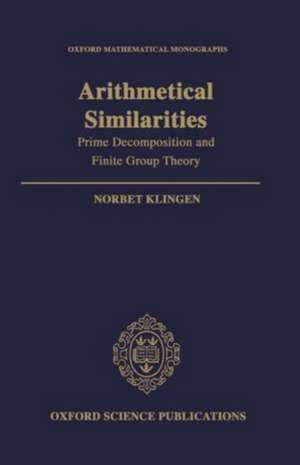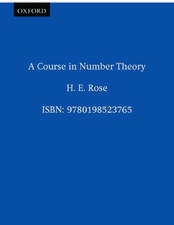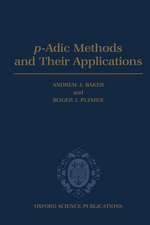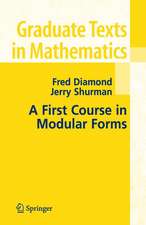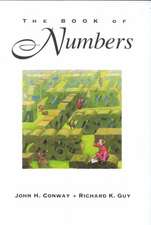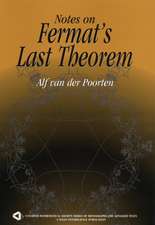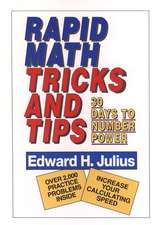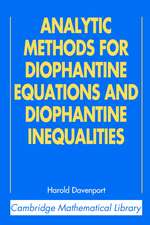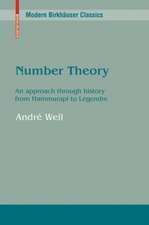Arithmetical Similarities: Prime Decomposition and Finite Group Theory: Oxford Mathematical Monographs
Autor Norbert Klingenen Limba Engleză Hardback – 30 apr 1998
Din seria Oxford Mathematical Monographs
- 33%
 Preț: 497.88 lei
Preț: 497.88 lei - 29%
 Preț: 848.48 lei
Preț: 848.48 lei - 34%
 Preț: 876.91 lei
Preț: 876.91 lei - 29%
 Preț: 849.69 lei
Preț: 849.69 lei - 31%
 Preț: 955.85 lei
Preț: 955.85 lei - 31%
 Preț: 1056.25 lei
Preț: 1056.25 lei - 34%
 Preț: 816.02 lei
Preț: 816.02 lei - 34%
 Preț: 2001.36 lei
Preț: 2001.36 lei - 31%
 Preț: 403.24 lei
Preț: 403.24 lei - 34%
 Preț: 1346.08 lei
Preț: 1346.08 lei - 34%
 Preț: 1282.44 lei
Preț: 1282.44 lei - 34%
 Preț: 1006.17 lei
Preț: 1006.17 lei - 34%
 Preț: 529.43 lei
Preț: 529.43 lei - 34%
 Preț: 828.44 lei
Preț: 828.44 lei - 38%
 Preț: 493.31 lei
Preț: 493.31 lei - 34%
 Preț: 592.45 lei
Preț: 592.45 lei - 34%
 Preț: 494.51 lei
Preț: 494.51 lei - 34%
 Preț: 1259.72 lei
Preț: 1259.72 lei - 34%
 Preț: 1469.52 lei
Preț: 1469.52 lei - 18%
 Preț: 678.36 lei
Preț: 678.36 lei - 34%
 Preț: 1026.90 lei
Preț: 1026.90 lei - 34%
 Preț: 1467.71 lei
Preț: 1467.71 lei - 34%
 Preț: 1251.21 lei
Preț: 1251.21 lei - 34%
 Preț: 991.27 lei
Preț: 991.27 lei - 31%
 Preț: 408.10 lei
Preț: 408.10 lei - 30%
 Preț: 967.10 lei
Preț: 967.10 lei - 34%
 Preț: 1594.03 lei
Preț: 1594.03 lei - 30%
 Preț: 1602.35 lei
Preț: 1602.35 lei - 34%
 Preț: 528.09 lei
Preț: 528.09 lei - 34%
 Preț: 874.95 lei
Preț: 874.95 lei - 34%
 Preț: 1286.13 lei
Preț: 1286.13 lei - 34%
 Preț: 791.05 lei
Preț: 791.05 lei - 25%
 Preț: 944.46 lei
Preț: 944.46 lei - 34%
 Preț: 1549.12 lei
Preț: 1549.12 lei - 31%
 Preț: 357.22 lei
Preț: 357.22 lei - 23%
 Preț: 1749.51 lei
Preț: 1749.51 lei - 34%
 Preț: 1403.75 lei
Preț: 1403.75 lei - 29%
 Preț: 875.58 lei
Preț: 875.58 lei - 16%
 Preț: 357.61 lei
Preț: 357.61 lei - 31%
 Preț: 323.18 lei
Preț: 323.18 lei - 34%
 Preț: 1498.32 lei
Preț: 1498.32 lei - 34%
 Preț: 1124.39 lei
Preț: 1124.39 lei - 25%
 Preț: 845.00 lei
Preț: 845.00 lei - 30%
 Preț: 820.84 lei
Preț: 820.84 lei - 34%
 Preț: 1009.86 lei
Preț: 1009.86 lei - 34%
 Preț: 505.14 lei
Preț: 505.14 lei - 31%
 Preț: 1420.46 lei
Preț: 1420.46 lei - 34%
 Preț: 1230.64 lei
Preț: 1230.64 lei - 39%
 Preț: 599.52 lei
Preț: 599.52 lei
Preț: 818.60 lei
Preț vechi: 1241.89 lei
-34% Nou
Puncte Express: 1228
Preț estimativ în valută:
156.64€ • 167.50$ • 130.60£
156.64€ • 167.50$ • 130.60£
Carte tipărită la comandă
Livrare economică 07-14 aprilie
Preluare comenzi: 021 569.72.76
Specificații
ISBN-13: 9780198535980
ISBN-10: 0198535988
Pagini: 286
Ilustrații: 14 line figures
Dimensiuni: 161 x 242 x 19 mm
Greutate: 0.58 kg
Editura: OUP OXFORD
Colecția OUP Oxford
Seria Oxford Mathematical Monographs
Locul publicării:Oxford, United Kingdom
ISBN-10: 0198535988
Pagini: 286
Ilustrații: 14 line figures
Dimensiuni: 161 x 242 x 19 mm
Greutate: 0.58 kg
Editura: OUP OXFORD
Colecția OUP Oxford
Seria Oxford Mathematical Monographs
Locul publicării:Oxford, United Kingdom
Recenzii
'...gives a very useful discussion of several 'generalisations and refinements of the theory developed in the preceding chapters, as well as [...] results from related areas which use the smae methods or lead to similar group theoretic problems' It may be regarded as a guide to the literature, and provides numerous sugggestions for further work' Bulletin London Mathematical Society
